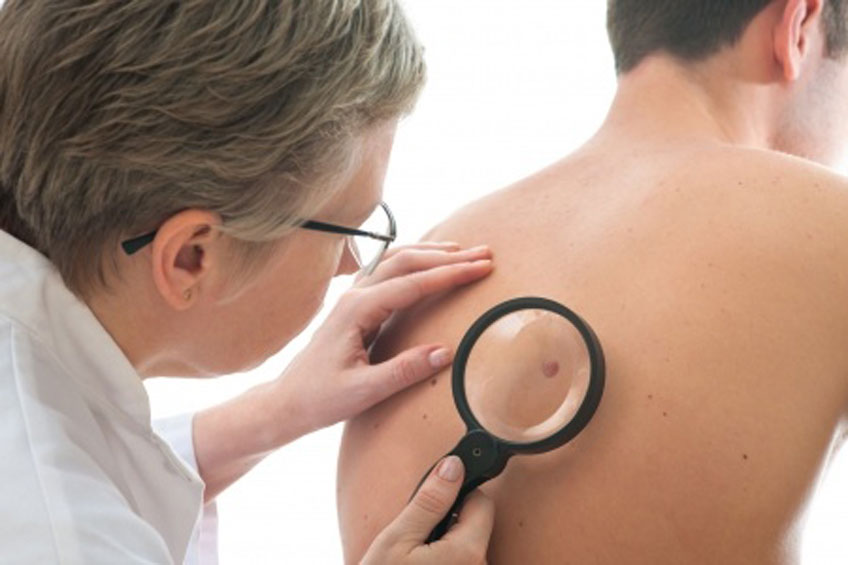 Skin Cancer is now the most common form of cancer in both Canada and the US with rates on the rise. Skin Cancer does not seem to be as scary as other types of cancers, but many people do not realize how disfiguring Basal Cell carcinoma can be, and Melanoma can certainly be fatal. We know that Skin Cancer is associated with UV exposure, and frequency of sunburn raises the risk of developing Melanoma. The public is now very aware that avoiding tanning beds and using sunscreen are protective measures, but there is more to it.
Skin Cancer is now the most common form of cancer in both Canada and the US with rates on the rise. Skin Cancer does not seem to be as scary as other types of cancers, but many people do not realize how disfiguring Basal Cell carcinoma can be, and Melanoma can certainly be fatal. We know that Skin Cancer is associated with UV exposure, and frequency of sunburn raises the risk of developing Melanoma. The public is now very aware that avoiding tanning beds and using sunscreen are protective measures, but there is more to it.
Oxidative Stress and Antioxidants for Skin Health

Non-melanoma skin cancer is the most common cancer among humans and solar UV radiation, particularly its UVB component (290-320 nm), is its major cause. One way to reduce the occurrence of the cancer is via the use of substances (often antioxidants) termed “photochemopreventive agents”. ‘Photochemoprotection’, which we define as ‘the use of agents capable of ameliorating the adverse effects of UVB on the skin’. Among many photochemoprotective agents, botanical antioxidants are showing promise. Because UV radiation is known to cause excessive generation of reactive oxygen species (ROS) thereby resulting in an oxidative stress condition. Approaches aimed at counteracting ROS production may be useful for the prevention of skin cancer. One approach to reduce its occurrence is through the eating of foods that have resveratrol in them. Resveratrol (trans-3,4′,5-trihydroxystilbene), a phytoalexin found in grapes, nuts, fruits, and red wine, is a potent antioxidant with strong anti-inflammatory and antiproliferative properties.
Summer Sparkler Event
MAY 12TH 6PM-8PM
Summer is just around the corner and with it comes weddings, bbqs, beaches and patios.
We want to help you have fun in the sun and sparkle at all your events.
Vitamin D Can Decrease Your Cancer Risk
A recent study conducted at the University Of California San Diego School Of Medicine has found higher levels of Vitamin D, specifically blood levels of 25 – Hydroxyvitamin D, are associated with a lowered risk of cancer.
ABCD’s of Skin Cancer Identification Vancouver

Skin cancer is one of the most common types of cancer and one of the easiest to identify. Unlike other cancers that develop unseen, skin cancer generally results in physical symptoms you can see on the skin.
Belly Fat and the Metabolic Syndrome

“The results from both epidemiological and physiological studies have demonstrated a strong association between excess abdominal adipose tissue and the presence of metabolic risk factors for coronary heart disease (CHD), including insulin resistance, impaired glucose tolerance, type 2 diabetes, dyslipidemia, and increased circulating inflammatory proteins”(1).
Is Stress Affecting your Weight Loss or Muscle Building Program?

I commonly hear many of my patients mentioning they are having a difficult time losing fat or gaining muscle even though they are working out very hard, lifting weights and eating very clean. The problem may be due to the amount of stress they are under. Specifically I am referring to Cortisol levels.
Breaking the Pain and Weight Cycle

A limiting factor to staying active and maintaining a healthy weight is pain.
When you first start an exercise regime, you will encounter sore achy muscles that can make exercise feel difficult. Starting slow and building up is a great way to ensure that you don’t end up with too much discomfort that will stop you from achieving your goals.
The Influence of Hormones on Weight Loss
For some people, it doesn’t appear to make sense why they can’t lose weight. They exercise 4 times per week or more with intense cardio and interval strength training. They eat a clean, low carb diet and have cut out most sugar and alcohol.
Test Your Gut Health
March 2016 Issue
Vitalia Health Care March Promotions:
Test Your Gut Health!
Do you suffer from Irritable Bowel Syndrome (IBS)? Most cases of IBS are due to an overgrowth of bacteria in the small intestine. A simple breath test can diagnose if you have an overgrowth of bacteria, causing your symptoms of gas, bloating and diarrhea. Our small intestinal bacterial overgrowth (SIBO) test is available this month at $260 (regular price $400). Call us today for more information!






